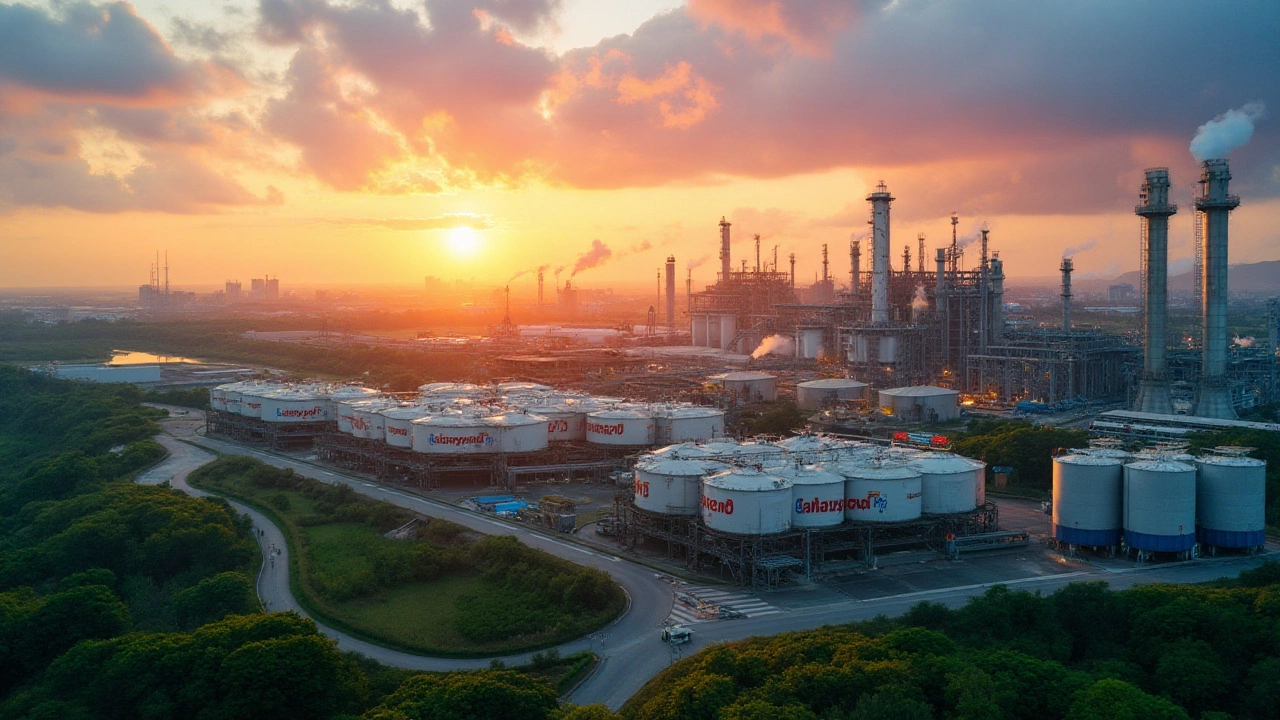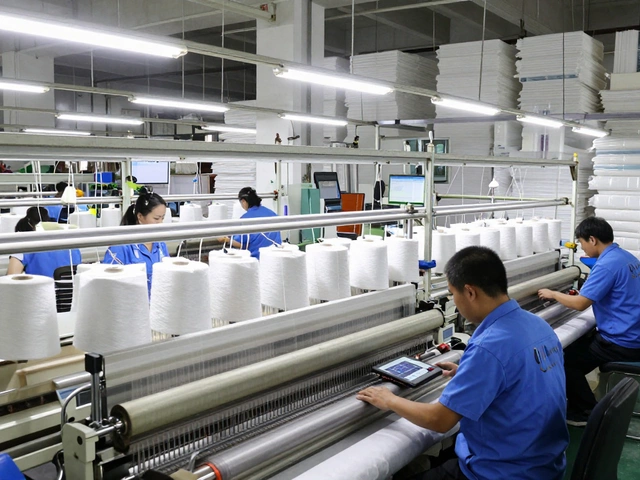Asia's Leading Chemical Giant: Unveiling the Largest Manufacturer

The chemical industry in Asia has witnessed unparalleled growth, cementing its role as a cornerstone of the region's economy and technological advancement. Leading this charge is a company that not only spearheads production but also exemplifies innovation and sustainability in practice.
Understanding who this giant is, and what makes its leadership so significant, offers insights into both current market dynamics and future potential. While India boasts numerous prominent players in the chemical market, this article uncovers the identity and journey of Asia's largest chemical manufacturer.
This prominence is not just a matter of scale but impacts how global markets operate, linking closely with supply chains and multiple industries. As we explore this pivotal entity, we delve into the undercurrents fostering such success and what comes next for this giant amid evolving global needs.
- Introduction to the Chemical Industry in Asia
- Spotlight on the Largest Chemical Company
- Economic Impact and Global Influence
- Innovations and Technological Advancements
- Future Trends in the Chemical Sector
Introduction to the Chemical Industry in Asia
The chemical industry in Asia stands as a critical pillar of the continent's economic and industrial landscape. This sector, known for its broad range of applications, touches various aspects of daily life - from agriculture, pharmaceuticals, construction, to even clothing and food packaging. Historically, Asia has leveraged its vast natural resources and dynamic workforce to build an expansive network of chemical production facilities, with countries like China, Japan, South Korea, and India at the forefront. This growth isn’t just about quantity; significant strides have been made in quality and innovation, paving the way for sustainable and cutting-edge solutions.
In recent years, Asia's chemical industry has been reshaped by rapid industrialization and urbanization. A key driver has been the increasing demand for chemicals domestically as populations grow and middle classes expand. Asia leads in the production of basic and specialty chemicals, and the region's importance keeps escalating on the global stage. As of 2023, Asia contributed more than 50% of the global chemical sales, a testament to its dominance. "The future of the chemical industry lies in Asia," noted one industry veteran at a recent international conference.
The region is not just a production hub but has also become a hotspot for innovation and research in the field. Investment in new technologies, such as green chemistry and bio-based products, positions Asia as a leader in sustainable practices. The emphasis on reducing environmental impact while meeting industrial demands reflects a nuanced understanding of modern-day challenges. Research partnerships between Asian and European companies are fostering cross-border innovation, highlighting the collaborative ethos of today's chemical landscape.
Additionally, governmental policies aimed at boosting industrial growth while safeguarding the environment play a crucial role. Countries like India have implemented regulations to ensure responsible chemical management and have incentivized the development of environmentally friendly alternatives. The strategy aligns with global sustainability goals, drawing a blueprint for other regions. The industry also benefits from strategic positioning along trade routes, facilitating the efficient movement of chemical goods to and from Asia. With this intricacy of factors shaping its trajectory, Asia's chemical industry promises to remain a vibrant and essential segment of the global economy.
Spotlight on the Largest Chemical Company
In the bustling world of chemical manufacturing within Asia, the name Reliance Industries stands tall as a beacon of industrial excellence. This company, headquartered in the vibrant city of Mumbai, India, is not only the largest in Asia but also ranks among the top players globally. Its vast network of production encompasses a range of key industries, marking its indelible influence across various sectors. Reliance’s journey to becoming Asia's chemical giant stems from strategic mergers, acquiring cutting-edge technologies, and an unwavering commitment to innovation. The company has deftly positioned itself to cater to both local and global markets, ensuring a consistent supply of vital raw materials that fuel countless industries. The leadership of Reliance Industries has significantly focused on expanding its petrochemical division, resulting in diversified high-value products that maintain stringent quality standards.
The company's dedication to integrating sustainable practices within its operations further underscores its progressive stance. With the global emphasis shifting towards eco-friendly solutions, Reliance Industries has proactively invested in green technologies, aiming to reduce its carbon footprint while optimizing its production efficiencies. This initiative is part of its broader strategy to align with international environmental standards and meet the surging demand for sustainable products. A recent report highlighted that the India chemical industry is predicted to grow exponentially, and Reliance is poised at the forefront of this growth. Such achievements are a testament not just to its massive scale, but to the robust strategies that guide its operations.
The influence of Reliance Industries extends beyond the confines of the chemical sector. As a conglomerate, its decisions reverberate through economic channels, impacting sectors like telecommunications, retail, and energy. This sprawling enterprise stands as a testament to strategic diversification, which has strengthened its position as an economic powerhouse within and outside India. In a statement, Mukesh Ambani, Chairman and Managing Director, remarked,
"We are committed to creating value by leveraging our core competencies while being conscious of the environments and societies we operate in."This philosophy underlines every venture the company undertakes, driving its relentless pursuit of greatness and setting a benchmark for competitors across the globe.
The company’s dedication to research and development is a cornerstone of its lasting success, as it continuously seeks to refine its processes and anticipate market needs. By investing heavily in state-of-the-art R&D facilities, Reliance Industries is able to stay ahead of technological advancements, ensuring they are consistently delivering cutting-edge solutions to their clients. This commitment has not only enabled them to capture significant market share but has also earned them accolades for innovation and excellence. Reliance's pioneering work in specialized polymers and advanced materials is a highlight of their research endeavors, opening new pathways for development and application. These breakthroughs reflect the company’s role in shaping the future of the chemical industry and its dedication to empowering its workforce to explore new territories and challenge conventional limits.

Economic Impact and Global Influence
Asia's largest chemical company, known for its extensive reach and influence, stands as a beacon within the global economic landscape. With its vast production capabilities, this industry giant underpins many sectors, from agriculture and pharmaceuticals to technology and consumer goods. This extensive footprint is not just about creating products but also about sustaining millions of livelihoods and energizing local and international economies. Its presence strengthens trade ties across continents, establishing Asia as a crucial hub for chemical manufacturing. The consistent quality and innovative approaches employed by this company also make it a preferred partner for various global enterprises, enhancing its influence in international markets.
One cannot underestimate the multiplier effect that this ASA’s largest chemical company generates. By pioneering sustainable practices and investing in green technologies, it paves the way for future-forward production models that attract like-minded partners and projects globally. As it continues to expand, it inevitably enhances its role in both regional and global supply chains, providing raw materials and specialized chemicals to countless industries worldwide. This company's economic strategies not only optimize profit but also embody a philosophy of responsibility and environmental stewardship, balancing growth with ecological considerations.
The financial statistics are a testament to this giant's prominence and impact. According to data published in relevant business reports, the company posted annual revenues exceeding $50 billion, with a steady year-on-year growth rate that signals its robust and adaptable business model. Its strategic positioning within developing markets further amplifies its influence, offering competitive pricing and localized solutions that meet the needs of diverse economies. In an interview published in 'Chemical Industry Magazine', a spokesperson stated,
"Our commitment lies in harnessing chemistry for a sustainable future, driving innovations that cross borders and industries."Such strategies extend beyond profits, revealing a commitment to a larger, positive economic narrative.
For those engaged in business analyses or economics, the company's economic cache is significant. An in-depth look reveals a formidable capacity to weather market fluctuations, underscored by its diversified product portfolio and adaptive logistical frameworks. This allows the company to modulate operations efficiently across different geopolitical climates, a crucial skill in today's interconnected but often volatile global market. It’s not just about economic metrics; the company’s influence transcends financial indicators, impacting educational collaborations and community development initiatives, thereby reinforcing its status as a global powerhouse.
Innovations and Technological Advancements
The journey of Asia's largest chemical company is marked by a relentless pursuit of innovation and technology. This focus has propelled it to the forefront of the global industry. The company invests significantly in research and development, understanding that the future of the India chemical industry and beyond hinges on cutting-edge solutions. Through a robust R&D framework, their laboratories work tirelessly, experimenting with new catalysts and processes that reduce waste and enhance efficiency. This commitment to innovation is not merely about staying ahead but transforming the very fabric of chemical manufacturing. New materials developed under their aegis are paving the way for lighter, stronger, and more sustainable products that are revolutionizing industries, from automotive to construction.
Among the noteworthy advancements is the company's integration of digital technologies into traditional manufacturing. The advent of the Industrial Internet of Things (IIoT) in their plants has led to smarter, more responsive manufacturing processes. Real-time data analytics enable them to monitor every aspect of production, ensuring that resources are optimally utilized and that any discrepancies are addressed immediately, minimizing downtime and improving safety protocols. Such digital integration is setting the trend in the largest chemical manufacturer circles, emphasizing efficiency and sustainability. By adopting automation and artificial intelligence, they are not just increasing productivity but also enhancing precision, leading to products that consistently meet the highest standards of quality.
"Our vision is to meld technology with tradition to create a future where innovation and sustainability go hand in hand," the CEO of the company remarked in a global summit, underscoring their strategic direction.
The company's innovations extend beyond processes into products that change lives. They have launched bio-based chemicals that reduce dependency on fossil fuels. These green alternatives have found applications across various sectors, including textiles and cosmetics, encouraging other producers to follow suit. This leadership in environmentally-conscious production underscores their role as a pioneer in sustainable chemistry, cultivating an industry-wide shift towards eco-friendly practices. The ripple effects of such innovations are resounding globally, influencing market trends and consumer expectations alike.
To further understand their impact, consider the following data point: The company has reduced its carbon emissions by 30% over the last five years, a significant achievement that highlights their dedication to environmental stewardship. This reduction is achieved through an alliance of advanced filtration systems, renewable energy practices, and innovative materials that consume less energy during production. While sustainability efforts are often seen as costly, their approach illustrates how technological advancements can lead to cost-effectiveness, reinforcing their position as a leader in the sector. By pioneering these changes, they also play a crucial role in shaping policies and standards across the Asia chemical company landscape.

Future Trends in the Chemical Sector
The chemical industry stands on the brink of significant transformation led by rapid technological advancements and increasing environmental awareness. This sector is moving towards more sustainable practices driven by both consumer demand and regulatory pressures. Asia's largest chemical companies are expected to lead this transition by integrating green chemistry principles into their operations. Companies are focusing on reducing the carbon footprint of their products and processes. This involves investing in cleaner production methods and biodegradable alternatives, placing them at the forefront of the industry's shift to sustainability.
Innovation is crucial as companies work on developing alternative feedstocks, like bio-based chemicals, while pursuing waste minimization strategies. The advent of digital technologies such as artificial intelligence, machine learning, and the Internet of Things (IoT) presents unprecedented opportunities within the industry. These technologies help optimize operations, enhance safety, and improve product development processes. A chemical company in Asia that successfully integrates these technologies can gain a competitive edge, becoming more agile and responsive to market changes.
The rise of electric vehicles is another trend impacting the chemical sector. The demand for batteries and lightweight materials is surging, prompting chemical companies to research and develop new materials that can meet these needs. An emphasis on electric and energy-efficient transportation pushes innovation towards creating lighter, stronger, and more durable materials. Additionally, the search for efficient energy storage solutions plays into the chemical industry's strengths, offering significant growth opportunities in the coming years.
One aspect not to overlook is the significance of collaboration. Companies are increasingly partnering with academic institutions, startups, and industries outside the traditional chemical sphere to drive cross-disciplinary innovation. By sharing knowledge and resources, these alliances help tackle complex challenges more efficiently. Market leaders are also investing heavily in R&D, understanding that staying ahead requires a commitment to discovering new applications and products that meet the evolving needs of consumers and the regulatory landscape.
"Adapting to change is not just about survival, but about creating a sustainable path forward," says renowned industry analyst, Dr. Meera Patel, emphasizing the importance of strategic foresight in the chemical market.
As the world becomes more interconnected, the role of Asia chemical companies on the global stage is more influential than ever. These firms are increasingly looking beyond their regional markets to invest internationally and broaden their influence in the global supply chain. With the right strategies, the chemical industry in Asia is poised not only to adapt but to lead in the face of these future challenges and opportunities, ensuring a vibrant and innovative future.


